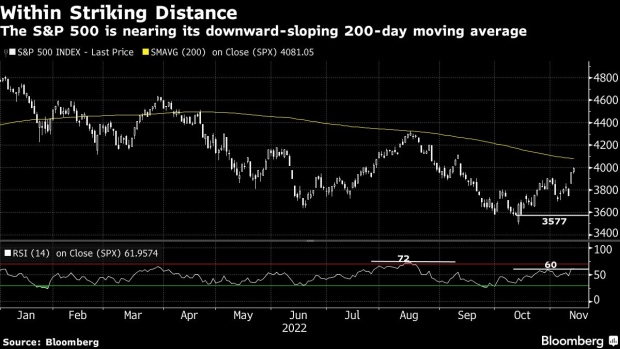Nov 14, 2022
JPMorgan’s Kolanovic Trims Bullish Stocks Call on Recession Risk
, Bloomberg News

(Bloomberg) -- Marko Kolanovic took another step in backing off the bullish stocks call that he had maintained throughout much of the market’s rout this year.
Kolanovic, co-head of global research at JPMorgan Chase & Co. and the most vocal bull on Wall Street, said in a report that he was reducing his overweight equities position because recession risks remain high.
The move follows a similar one he made last month, when he cut the size of his equity overweight and bond underweight allocations, citing increasing risks from central bank policies and geopolitics.
With a Fed Funds rate close to 5%, a recession will be hard to avoid unless the Federal Reserve “more meaningfully pivots,” Kolanovic wrote in a note to clients this week. While he remains overweight equities and is long-term positive, Kolanovic said JPMorgan will use the rally from last week as an opportunity to “moderately reduce our equity OW.”
“Our optimism is tempered by the still elevated recession risks, and risk that the October CPI data proves anomalous and/or fails to reduce central bankers’ eagerness to push policy into more restrictive territory,” he wrote.
Kolanovic, voted the No. 1 equity-linked strategist in last year’s Institutional Investor survey, hasn’t had much success with his bullish calls so far in 2022. Over the summer he maintained that the US stock market was poised for a gradual recovery in 2022 and that the S&P 500 would likely end the year unchanged, repeatedly urging investors to buy the dip.
Thursday’s CPI-fueled relief rally has given investors hope that the latest rebound has more room to run as the benchmark nears its 200-day moving average. The S&P 500 has risen nearly 11% from a mid-October low.
In Kolanovic’s latest note, he is adjusting the bank’s model portfolio by:
- Exiting the long dollar bias
- Moving previous emerging market sovereigns underweight back to neutral
- Adding exposure to corporate bonds, focused on high-yield, to close credit underweight
- Trimming equity overweight given elevated recession risks and the strong market rally last week
- Reversing previous overweight in US vs European high-grade credit as the latter offers a larger risk premium
- Remaining overweight commodities given potential tailwinds from easing Covid restrictions in China, and as a hedge for geopolitical risks and inflation
Meanwhile, to Goldman Sachs, equity investors may be too optimistic on long-term growth prospects even through there’s a high likelihood of stocks outperforming bonds in the coming decade, the bank’s strategists led by Christian Mueller-Glissmann wrote in a report on Tuesday.
The US equity and bond yield gap has declined as a result of relatively elevated stock valuations and large increases in credit yields, nearing levels last seen in the 1990s and early 1970s, they wrote. In addition, there could be upward pressure next year on equity risk premia, which tend to be cyclical and increase sharply with recessions and rising unemployment.
“With relatively high bond yields, peaking rates volatility but elevated growth uncertainty, the case for higher equity allocations is still mixed,” they wrote.
--With assistance from Jessica Menton.
(Adds details on Goldman Sachs call in last four paragraphs)
©2022 Bloomberg L.P.





